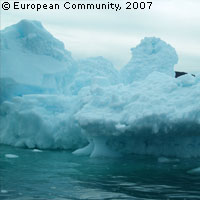New service to improve ice monitoring in Europe
The Danish Meteorological Institute, the Finnish Institute of Marine Research and the Norwegian Meteorological Institute (met.no) are to join forces in order to improve operational ice monitoring and forecasting in the Arctic Ocean and the Baltic Sea. Their new European Ice Service (EIS) is intended to complement the traditional national ice services that are already in place in the three countries involved. Project partners want to increase public awareness of the ice-infested seas of Europe and their significance in understanding climate change processes at high latitudes, as well as their impact on climate change. They also hope to create a European service equivalent to the joint North American Ice Service, making a substantial contribution to international programmes in the European Polar areas and providing high-resolution data sets for the climate change community. 'The EIS services will be implemented both on a global and regional scale and will be tailored to meet specific user requirements both for land and sea operations,' Erik Buch, head of the Centre for Sea and Ice at the Danish Meteorological Institute, commented. Alongside other data, the EIS will attempt to gradually increase the use of satellite data in order to improve the quality of its products and services. The three institutes involved are sure that the EIS 'will be a strong and unified voice when needs and requirements for future satellite missions are discussed'. 'The EIS benefits to European citizens will be revealed through improved policy and decision-making, particularly by better management of environment, prevention and control of marine pollution and conservation of the Arctic and Baltic ecosystems,' they conclude, 'but also by safer marine transportation and offshore operations, for instance by improved design criteria for vessels and marine constructions.'
Countries
Denmark, Finland



